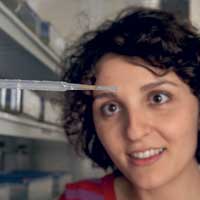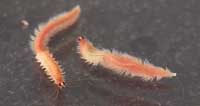Memories of a very special teacher Inspire article
Fay Christodoulou, a Greek PhD student at the European Molecular Biology Laboratory (EMBL), is an example that shows not every researcher is born with a passion for science. She describes to Anna-Lynn Wegener from EMBL how her biology teacher inspired a long-lasting interest in science.
Did you always want to become a biologist?

Image courtesy of EMBL Photo
Lab
To tell you the truth, it was a very spontaneous decision. Initially I wanted to go into economics, which might seem a bit strange because the fields are not very related. I had already finished the first year of my international baccalaureate and had chosen those subjects that would lead to a career in economics when I suddenly changed my mind and decided to study biology. It was really difficult to convince the head of my school that I was serious about this change. I had missed a whole year’s worth of biology lessons while I was studying economics and I had to catch up with all the material by myself. So biology wasn’t an easy option.
So, what happened in the last year of school that made you change your mind? Was there a specific event that awoke your interest in biology?
Not an event, but a person: Dr. Alexander Alevizos, my biology teacher at school in Athens, Greece. He was the one who made me realise my passion for biology. The interest came from the material that biology offers, but he was the one who contributed the inspiration.
And what was so special about him and his lessons?
Sometimes teachers come into the classroom and give a 45-minute lesson out of the textbook. But my biology teacher was special in that he was very well informed: he followed cutting-edge science as well as the news and he knew about the applications of science. He chose thrilling examples to illustrate the material: one day he told us about the Gene Police that had been established in Canada when the first transgenic crops emerged. Farmers were very concerned that the modified plants could contaminate their natural crops and many of them tried to sue companies working with the modified crops. So the Gene Police were established to screen the crops genetically to see if contamination had actually occurred. Dr. Alevizos used the story to explain the science underlying genetic modification and cross-pollination and we absorbed this information without really realising it because we were so fascinated by the story. And he did not stop at the science: he also involved us in a discussion about bioethics based on this example. That is something I really liked, that he gave an overview of all aspects of science, from molecular details to moral implications.
Another thing that made his lessons really interesting was that he always tried to put science into a wider context. He would, for example, talk about the history of a scientific breakthrough or the political consequences that a discovery can have. And he painted a very human picture of the personalities behind science, which made it easy for us to identify with them.
Judging from your enthusiasm about his lessons, all your classmates should be biologists by now.
Some are. Others have of course chosen a different path, but even they must have gained a lot from Dr. Alevizos’ lessons. He never pushed us to become scientists, instead he tried to show us how useful a basic knowledge of biology can be for all sorts of things. For example, he used to tell us that people in the marketing or advertising sector are always looking for candidates who can understand science, because they need to promote products based on science. Similarly, in law and the patenting business he said that a background in biology can open many doors. By acknowledging that not every student wants to become a scientist, he also reached and inspired those students who had no interest in biology at all.
But you clearly had an interest and decided to become a molecular biologist. What exactly are you doing now?

Image courtesy of EMBL Photo
Lab
I have just finished the first year of my PhD studies in Detlev Arendt’s group at the European Molecular Biology Laboratory in Heidelberg, Germany. We are trying to understand how the brain evolved. The human brain is very complex with many subunits, but it started off as a simple organ and gradually evolved into something more complex. The last ancestor of humans (and many other species) that had this simplistic brain is what interests me, because I would like to know how it all began.
This is why I am working on a sea worm called Platynereis dumerilii, which we think is quite similar to this last ancestor. In particular I am looking at the hypothalamus, a part of the brain that is very ancient in terms of the functions that it controls: thirst, hunger, sex drive, reproduction, aggression and other basic functions. I want to find out how a chemical pathway that is crucial for the development of the brain in the embryo works in this worm. We can then compare it with the pathway in other organisms to see what has changed during evolution.
Are you happy with your choice to go into research?
I love what I am doing and I really like the room for creativity in science. You get to design your own experiments, and obtaining a result from an experiment that you designed yourself is very rewarding. This is also what keeps me going in periods when I am working hard but getting no results at all. This can be a bit frustrating sometimes, but the feeling when you achieve what you are aiming for is so great that I would never exchange my work for any other.
And what are your plans for the future?
If everything goes well, I would love to lead my own laboratory at some point and also to teach students, either at university or even at school.
That sounds like another thing that might have been inspired by your biology teacher.
Yes, definitely. This man has influenced my life so much and helped me to find my way. I would love to be able to do something similar for other people one day.
Institutions
Review
For me as a primary school teacher constantly trying to find different and creative ways to inspire my pupils, the article was a refreshing read. So often in teaching, amidst all the planning, marking and assessment, it is possible to lose sight of the wider goal of developing a child’s curiosity about and engagement with their environment. Fay’s experience served to give me a welcome reminder.
Without too much science terminology, it hits a satisfying target in giving the view of teaching from the other side. To read about the inspiration given by one teacher – inspiration that changed lives and widened horizons – makes me aim to do this in my own teaching. I will continue to grasp the moment, to stray a little from the formal curriculum, and to tell the story around the science, reinforced by the knowledge that it can and does make a difference.
Andrea Goetzee, UK





